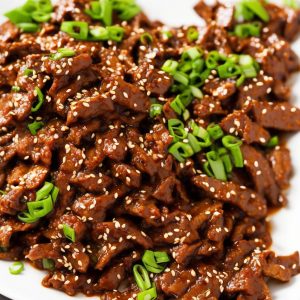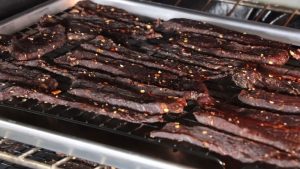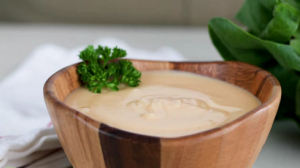Dive into the harmonious blend of flavors offered by the Instant Pot Beef Bulgogi. This Korean dish, traditionally grilled, is now adapted for the convenience of the Instant Pot, preserving the succulent and tender essence of the beef marinated in a rich, spicy-sweet sauce. Paired with tangy pickled daikon radish and the heat from gochujang mayo, it's a feast of contrasts that will transport your senses straight to Seoul.
The key ingredients for this dish are gochujang, a staple in Korean cuisine known for its sweet and spicy kick, and daikon radish, which adds a refreshing crunch when pickled. You might also need to pick up an Asian pear, used in the marinade to tenderize the beef and add a hint of sweetness. These ingredients might not be in your regular pantry but can be found in the international aisle of most supermarkets or at an Asian grocery store.
Ingredients for Instant Pot Beef Bulgogi, Pickled Daikon Radish, and Gochujang Mayo
Beef chuck roast: The main protein in this dish, selected for its rich flavor and tender texture when cooked in the Instant Pot.
White onion: Adds a layer of sweetness and depth to the marinade and eventually the beef.
Gochujang: A Korean chili paste that brings heat and complexity to the marinade and mayo.
Asian pear: Used in the marinade to tenderize the beef and add a hint of sweetness.
Fresh ginger: Provides a bit of heat and aromatic qualities to the marinade.
Garlic: A flavor powerhouse that adds savory depth to the marinade.
Soy sauce: Provides umami, enhancing the other flavors in the marinade.
Sesame oil and seeds: Adds a nutty flavor to the marinade, and sesame seeds give a nice crunch.
Granulated sugar: Balances the heat and salty elements in the marinade.
Daikon radish: When pickled, it lends a tangy and crunchy contrast to the rich beef.
Mayonnaise: The base of the gochujang mayo, adding creaminess to balance the heat.
Rice vinegar: Used in pickling the radish and adding tang to the gochujang mayo.
Kosher salt: Used for seasoning and in pickling the radish.
One reader, Dorisa Dutton says:





This instant pot beef bulgogi recipe is a game-changer! The flavors are rich and the meat is incredibly tender. The pickled daikon and gochujang mayo add the perfect balance of tanginess and creaminess. It's a must-try for anyone who loves Korean cuisine. Highly recommended!
Techniques Required for Making Instant Pot Beef Bulgogi
Marinate the beef: Combine the beef, onion, gochujang, Asian pear, ginger, garlic, soy sauce, sesame oil, sesame seeds, and sugar in a large bowl. Toss until the beef is well coated, then cover the bowl with plastic wrap and refrigerate for at least 2 hours up to 6 hours.
Prepare pickled daikon radish: Toss the daikon radish and salt together in a large bowl, then let it sit at room temperature for 15 minutes until the salt has dissolved and the radish has released most of its liquid. Rinse the daikon thoroughly with cold water, then add hot water, rice vinegar, and sugar. Stir until the sugar is fully dissolved, cover with plastic wrap, and let sit at room temperature for at least 2 hours.
Make gochujang mayo: Whisk together the mayonnaise, gochujang, rice vinegar, sesame oil, and salt in a medium bowl.
Cook beef bulgogi in the Instant Pot: Transfer the marinated beef and its marinade to an Instant Pot. Close the lid to seal and cook on high pressure for 20 minutes. Allow to naturally release for 15 minutes, then turn the steam valve to venting to release the remaining pressure before opening.
Broil the beef: Transfer the beef to a baking sheet using a slotted spoon. Place the baking sheet under the broiler for 4 to 5 minutes until slightly charred.
Serve: Serve the beef immediately with the pickled daikon, gochujang mayo, and kimchi toppings.
How To Make Instant Pot Beef Bulgogi
Whip up this classic Korean beef bulgogi easily in your handy instant pot! It’s paired with pickled radish and gochujang mayo for a more flavorful meal.
Serves:
Ingredients
For Beef Bulgogi:
- 2lbbeef chuck roast,thinly sliced
- ½medium white onion,thinly sliced
- 3tbspgochujang
- 1meduim asian pear,peeled and grated
- 1tspfresh ginger,grated
- 6garlic cloves,grated
- ⅓cupsoy sauce
- 2tbspsesame oil
- 1tbspsesame seeds
- 1tbspgranulated sugar
For Pickled Daikon Radish:
- 1small daikon radish,peeled, halved, and thinly sliced
- 1tbspkosher salt
- ½cuphot water
- ½cuprice vinegar
- ¼cupgranulated sugar
For Gochujang Mayo:
- 1cupmayonnaise
- 2tbspgochujang,(red chilli paste)
- 1tbsprice vinegar
- 2tspsesame oil
- ½tspkosher salt
For Serving:
- rice,cooked, or lettuce cups
For Kimchi:
- scallion,thinly sliced
- sesame seed
- carrot,shredded
- cucumber,thinly sliced
- egg,fried
Instructions
Marinate:
-
In a large bowl, combine the beef, onion, gochujang, Asian pear, ginger, garlic, soy sauce, sesame oil, sesame seeds, and sugar.
-
Toss until the beef is well coated, then cover the bowl with plastic wrap.
-
Transfer to the refrigerator to marinate for at least 2 hours up to 6 hours.
Pickled Daikon Radish:
-
While the bulgogi marinates, in a large bowl, toss the daikon radish and salt together until fully coated.
-
Let sit at room temperature for 15 minutes, until the salt has dissolved and the radish has released most of its liquid.
-
Transfer the daikon to a mesh strainer, then rinse thoroughly with cold water.
-
Return the drained daikon to the bowl, then add the hot water, rice vinegar, and sugar and stir until the sugar is fully dissolved.
-
Cover with plastic wrap, then let sit at room temperature for at least 2 hours.
Gochujang Mayo:
-
In a medium bowl, whisk together the mayonnaise, gochujang, rice vinegar, sesame oil, and salt.
-
Set aside until ready to use.
Beef Bulgogi:
-
Transfer the beef and its marinade to an Instant Pot.
-
Close the lid to seal and cook on High pressure for 20 minutes.
-
Once the 20 minutes has elapsed, allow to naturally release for 15 minutes.
-
Turn the steam valve to venting to release the remaining pressure before opening.
-
Arrange an oven rack at the top third of the oven, then turn on the broiler.
-
Using a slotted spoon, transfer the beef to a baking sheet.
-
Place the baking sheet under the broiler for 4 to 5 minutes, until slightly charred.
-
Serve the beef immediately with the pickled daikon, gochujang mayo, and kimchi toppings, and enjoy!
Nutrition
- Calories: 965.25kcal
- Fat: 68.30g
- Saturated Fat: 13.20g
- Trans Fat: 0.56g
- Monounsaturated Fat: 21.50g
- Polyunsaturated Fat: 33.10g
- Carbohydrates: 35.61g
- Fiber: 4.39g
- Sugar: 23.80g
- Protein: 53.65g
- Cholesterol: 167.67mg
- Sodium: 2486.66mg
- Calcium: 104.16mg
- Potassium: 1301.18mg
- Iron: 7.67mg
- Vitamin A: 8.13µg
- Vitamin C: 18.39mg
Instant Pot Technique Tip for Perfect Beef Bulgogi
When preparing the beef bulgogi, it's important to cut the beef chuck roast against the grain. This will ensure that the meat is tender and absorbs the marinade effectively. Additionally, when broiling the beef, keep a close eye on it to prevent it from burning. The goal is to achieve a slight char which adds a smoky flavor to the dish.
Time-Saving Tips for Instant Pot Beef Bulgogi
Marinate efficiently: Cut the beef into thin slices to reduce marinating time. The increased surface area allows the flavors to penetrate the meat more quickly.
Instant pot magic: Utilize the instant pot to cook the beef bulgogi. It significantly reduces the cooking time while still infusing the dish with rich flavors.
Prep ahead: Prepare the pickled daikon radish, gochujang mayo, and kimchi toppings in advance to streamline the cooking process and save time when assembling the dish.
Multi-task: While the beef is marinating, use that time to prepare the pickled daikon radish and gochujang mayo. This way, you can efficiently utilize the marinating time.
Thinly slice: Slice the beef thinly before marinating to reduce the cooking time in the instant pot, ensuring that the meat cooks quickly and evenly.
Substitute Ingredients For Instant Pot Beef Bulgogi Recipe
beef chuck roast - Substitute with beef sirloin: Beef sirloin is a leaner cut of beef that can be used as a substitute for beef chuck roast. It is tender and flavorful, making it a great alternative for bulgogi.
gochujang - Substitute with sriracha and miso paste: A combination of sriracha and miso paste can provide a similar spicy and savory flavor profile to gochujang, making it a suitable substitute for this recipe.
asian pear - Substitute with Bosc pear: Bosc pears have a similar texture and sweetness to Asian pears, making them a good substitute for adding a touch of sweetness to the bulgogi marinade.
rice vinegar - Substitute with apple cider vinegar: Apple cider vinegar can be used as a substitute for rice vinegar to provide the desired tangy acidity in the pickled daikon radish.
mayonnaise - Substitute with Greek yogurt: Greek yogurt can be used as a healthier alternative to mayonnaise for making the gochujang mayo, providing a creamy texture and tangy flavor.
daikon radish - Substitute with red radish: Red radishes can be used as a substitute for daikon radish in the pickled radish, providing a similar crunchy texture and a slightly peppery flavor.
sesame oil - Substitute with peanut oil: Peanut oil can be used as a substitute for sesame oil to provide a nutty flavor and aroma in the bulgogi marinade.
granulated sugar - Substitute with honey: Honey can be used as a natural sweetener in place of granulated sugar, adding a touch of sweetness to the bulgogi marinade.
soy sauce - Substitute with tamari: Tamari, a gluten-free soy sauce, can be used as a substitute for soy sauce to maintain the umami flavor in the bulgogi marinade.
garlic cloves - Substitute with garlic powder: Garlic powder can be used as a substitute for fresh garlic cloves, providing a similar garlic flavor to the marinade.
white onion - Substitute with yellow onion: Yellow onions can be used as a substitute for white onions, providing a slightly sweeter flavor to the bulgogi marinade.
Presenting Your Instant Pot Beef Bulgogi
Elevate the plating: When presenting the beef bulgogi, focus on creating a visually appealing plate. Arrange the charred beef slices in an artful manner, perhaps overlapping them slightly to create height and dimension on the plate.
Incorporate vibrant colors: Introduce pops of color to the plate by garnishing with thinly sliced scallions and vibrant kimchi. The contrast of the bright green and red against the rich, caramelized beef will enhance the visual appeal of the dish.
Balance the elements: Pay attention to the balance of flavors and textures on the plate. Consider adding a small mound of fluffy rice to complement the bold and savory flavors of the beef bulgogi.
Utilize negative space: Embrace the concept of negative space on the plate to allow the main components of the dish to shine. Avoid overcrowding the plate and allow the elements to stand out against a clean, white backdrop.
Incorporate elegant garnishes: Elevate the presentation with delicate sesame seeds sprinkled strategically over the beef bulgogi. This adds a touch of sophistication and texture to the dish.
Focus on precision: Pay attention to the placement of each component, ensuring that every element is purposefully arranged to create a visually stunning presentation that reflects the artistry and skill behind the dish.
Essential Tools for Making Beef Bulgogi in an Instant Pot
Instant Pot: A multi-functional electric pressure cooker that can be used for cooking, sautéing, steaming, and more.
Large bowl: Used for marinating the beef and mixing ingredients.
Plastic wrap: Used for covering the marinating bowl and pickling daikon radish.
Mesh strainer: Used for draining and rinsing the pickled daikon radish.
Baking sheet: Used for broiling the beef bulgogi.
Oven: Utilized for broiling the beef bulgogi.
Slotted spoon: Used for transferring the beef from the Instant Pot to the baking sheet.
Instant Pot: Used for pressure cooking the beef bulgogi.
Whisk: Used for mixing and preparing the gochujang mayo.
Medium bowl: Utilized for preparing the gochujang mayo.
Large bowl: Used for pickling the daikon radish.
Baking sheet: Used for broiling the beef bulgogi.
Oven: Utilized for broiling the beef bulgogi.
Slotted spoon: Used for transferring the beef from the Instant Pot to the baking sheet.
Storing and Freezing Your Instant Pot Beef Bulgogi
- Once the beef bulgogi has cooled to room temperature, transfer it to an airtight container or resealable plastic bag. Store in the refrigerator for up to 4 days.
- To freeze the beef bulgogi, place the cooled meat in a freezer-safe container or resealable plastic bag, removing as much air as possible. Label the container with the date and freeze for up to 3 months.
- When ready to enjoy the frozen beef bulgogi, thaw it overnight in the refrigerator. Reheat the meat in a skillet over medium heat until warmed through, or microwave in short intervals until heated to your desired temperature.
- Store any leftover pickled daikon radish in an airtight container in the refrigerator for up to 2 weeks. The flavor will continue to develop over time.
- The gochujang mayo can be stored in an airtight container in the refrigerator for up to 1 week. Give it a good stir before using, as some separation may occur.
- If you have any leftover rice, store it in an airtight container in the refrigerator for up to 5 days. To reheat, add a splash of water and microwave in short intervals, stirring between each interval, until heated through.
- Leftover kimchi toppings, such as scallions, sesame seeds, carrots, and cucumbers, can be stored separately in airtight containers in the refrigerator for up to 5 days. Use them to garnish other dishes or enjoy as a refreshing side.
How To Reheat Leftover Instant Pot Beef Bulgogi
Reheat the beef bulgogi in a skillet or wok over medium-high heat. Add a splash of water or beef broth to help rehydrate the meat and prevent it from drying out. Stir-fry for 3-5 minutes until heated through and the liquid has evaporated. This method helps to retain the texture and flavor of the beef.
For a quick and easy reheating option, microwave the beef bulgogi in a microwave-safe dish. Cover the dish with a damp paper towel to help retain moisture. Microwave on high for 1-2 minutes, stirring halfway through, until the beef is heated through. Be careful not to overheat, as this can cause the meat to become tough.
If you have leftover rice and beef bulgogi, create a delicious fried rice dish. Heat a tablespoon of oil in a large skillet or wok, then add the rice and beef. Stir-fry for 3-4 minutes, adding any desired vegetables like peas, carrots, or onions. Season with soy sauce and sesame oil to taste.
Transform your leftover beef bulgogi into a hearty soup. In a pot, sauté onions and garlic in a bit of oil. Add beef broth or water, bring to a boil, then reduce heat and add the beef bulgogi. Simmer for 5-10 minutes, then add your favorite vegetables like bok choy, mushrooms, or spinach. Season with soy sauce, gochujang, and sesame oil to taste.
For a crispy texture, reheat the beef bulgogi under the broiler. Place the meat on a foil-lined baking sheet and broil for 2-3 minutes, or until the edges start to caramelize and crisp up. Keep a close eye on the meat to prevent burning. Serve the crispy beef bulgogi over rice or in lettuce wraps for a low-carb option.
Interesting Trivia About Beef Bulgogi
The recipe for beef bulgogi is a popular Korean dish that is known for its sweet and savory flavors. It is traditionally made with thinly sliced beef that is marinated in a mixture of soy sauce, sugar, sesame oil, and other seasonings. The use of gochujang, a Korean chili paste, adds a spicy kick to the dish. The pickled daikon radish, gochujang mayo, and kimchi toppings provide a balance of flavors and textures to the meal. Beef bulgogi is a versatile dish that can be served with rice or used as a filling for tacos or sandwiches. It's a delicious and satisfying meal that showcases the rich and diverse flavors of Korean cuisine.
Is Making Beef Bulgogi in an Instant Pot Cost-Effective?
The cost-effectiveness of this instant pot beef bulgogi recipe largely depends on the availability and prices of the ingredients in your location. Beef chuck roast and Asian pear can be relatively expensive, but the dish serves 4 people and utilizes affordable pantry staples like soy sauce and garlic. The approximate cost for a household of 4 people would be around $25-$30. Considering the flavor, convenience, and the fact that it can be stretched into multiple meals, this recipe rates a solid 8 for cost-effectiveness.
Is Instant Pot Beef Bulgogi Healthy or Unhealthy?
The instant pot beef bulgogi recipe is a delicious and flavorful dish, but it may not be the healthiest option due to some of its ingredients and cooking methods. Here's a breakdown of the recipe's health aspects:
- The beef chuck roast is a fatty cut of meat, which can contribute to high saturated fat and cholesterol intake.
- The recipe includes a significant amount of sugar and salt, which can lead to excessive sodium and added sugar consumption.
- Gochujang, a Korean red chili paste, is high in sodium and may not be suitable for those with high blood pressure or salt sensitivity.
- The use of mayonnaise in the gochujang mayo adds extra fat and calories to the dish.
- On the positive side, the recipe incorporates some healthy ingredients like onion, garlic, ginger, and Asian pear, which provide vitamins, minerals, and antioxidants.
To make this recipe healthier, consider the following suggestions:
- Opt for a leaner cut of beef, such as sirloin or tenderloin, to reduce the overall fat content.
- Reduce the amount of sugar and salt used in the marinade and gochujang mayo. You can replace some of the sugar with natural sweeteners like honey or maple syrup.
- Use low-sodium soy sauce to decrease the dish's salt content.
- Replace the mayonnaise in the gochujang mayo with a healthier alternative, such as Greek yogurt or avocado, to lower the fat and calorie content.
- Increase the proportion of vegetables in the dish by adding more onions, carrots, and cucumbers. This will boost the fiber, vitamin, and mineral content of the meal.
- Serve the beef bulgogi with a side of brown rice instead of white rice to increase the dish's fiber and nutrient profile.
- Use a non-stick cooking spray or a small amount of oil when broiling the beef to reduce the added fat.
By making these adjustments, you can enjoy a healthier version of the instant pot beef bulgogi recipe without compromising on taste and flavor.
Editor's Opinion on This Instant Pot Beef Bulgogi Recipe
The recipe for Instant Pot Beef Bulgogi is a delightful fusion of flavors and textures. The marinated beef, cooked to perfection in the Instant Pot, promises tender and succulent bites. The pickled daikon radish adds a refreshing tang, while the gochujang mayo brings a creamy and spicy kick. The combination of these elements creates a harmonious and satisfying dish. The inclusion of traditional accompaniments like kimchi further enhances the overall dining experience. This recipe is a wonderful representation of Korean cuisine, and its vibrant flavors are sure to impress.
Enhance Your Instant Pot Beef Bulgogi Recipe with These Unique Side Dishes:
Similar Recipes to Instant Pot Beef Bulgogi
Appetizer and Dessert Pairings for Instant Pot Beef Bulgogi
Was this page helpful?
Have your own special recipe to share? Submit Your Recipe Today!












